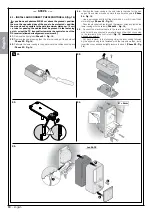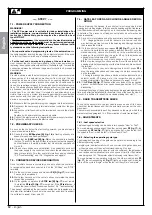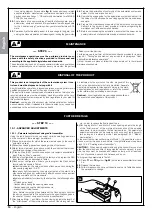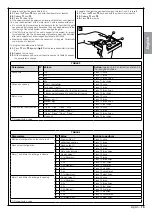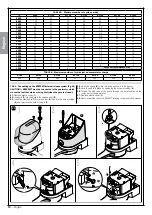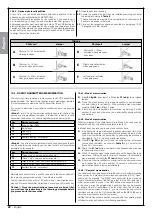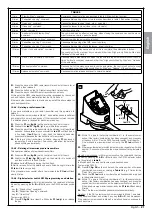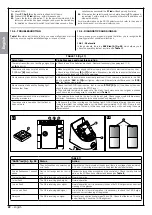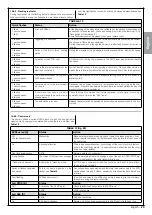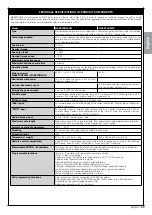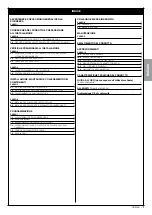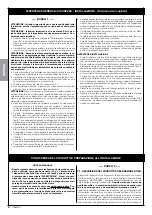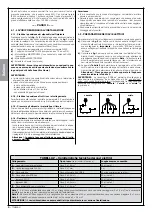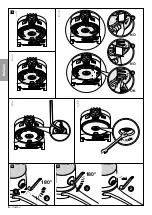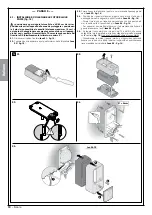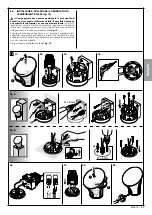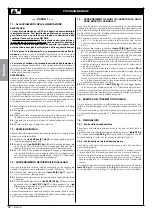
English –
23
English
10.6.2 - Flashing indicator
During the manoeuvre the flashing indicator flashes once every second.
When something is wrong the flashes are more frequent (every half sec-
ond); the light flashes twice with a second’s pause between flashes, see
Table 12
.
10.6.3 - Control unit
The control unit has a series of LEDs, each of which can give particular
signals both during regular operation and when there is a problem, see
Table 13
.
TABLE 13 (fig. 29)
ECSbus led [A]
Status
Action
Off
The led flashes slowly
Malfunction
Make sure there is power supply; check to see if the fuses are blown; if nec-
essary, identify the reason for the failure and then replace the fuses ones of
the same type
On
Serious malfunction
There is a serious malfunction; try switching off the control unit for a few sec-
onds; if the condition persists, it means there is a malfunction and the circuit
board has to be replaced
One flash every second
All OK
Normal operation of control unit
2 long flashes
The status of the inputs has changed This is normal when there is a change in one of the inputs: OPEN, STOP, trig-
gering of photocells or the radio transmitter is in use
1 flash every 5 seconds
Automation in “standby” mode
All OK; when a command arrives, the control unit will reset to normal func-
tioning (after a brief delay)
Series of flashes separated
by a pause
This is the same signal as on the
flasher, see
Table 12
An overload has been detected and therefore the power supply to the ECS-
bus has been turned off. Check, possibly by disconnecting each device one
at a time
Fast flashing
ECSbus short circuit
To switch on power to the ECSbus you simply need to give the command,
for example, using the radio transmitter
Led STOP [B]
Status
Action
Off
*
Activation of the STOP input
Check the devices connected to the STOP input
On
All OK
STOP Input active
Led SbS [C]
Status
Action
Off
All OK
SbS input not active
On
SbS input activation
Normal only if the device connected to the SbS input is definitely active
TABELLA 12
Quick flashes
Status
Action
1 flash
1 second pause
1 flash
Error on ECSbus
At the beginning of the manoeuvre, the verification of the devices present does not
correspond to those learned; check and possibly try to redo the learning (10.3.3
“Recognition of other devices” ).
Some faulty devices may be present; check and replace them
2 flashes
1 second pause
2 flashes
Triggering of a photocell
At the start of the manoeuvre, one or more photocells are preventing movement;
check to see if there are any obstacles.
During the movement, although the obstacle is effectively present, no action is
required
3 flashes
1 second pause
3 flashes
Action of the “motor force” limiting
device
During the movement, the gate experienced excessive friction; identify the cause.
4 flashes
1 second pause
4 flashes
Activation of the STOP input
At the start of or during the manoeuvre, the STOP input was activated; identify
the cause
5 flashes
1 second pause
5 flashes
Error in the internal parameters of the
electronic control unit
Wait at least 30 seconds, then try giving a command; if the condition persists it
means there is a serious malfunction and the electronic board has to be replaced
6 flashes
1 second pause
6 flashes
The maximum manoeuvre limit/hour
has been exceeded
Wait for a few minutes until the manoeuvre limiting device drops to under the
maximum limit
7 flashes
1 second pause
7 flashes
There is an error in the internal elec-
tric circuits
Disconnect all the power circuits for a few seconds and then try to give the com-
mand again. if the condition persists it means there is a serious malfunction and the
electronic board has to be replaced
8 flashes
1 second pause
8 flashes
A command that does not permit
other commands to be performed is
already present
Check the type of command that is always present; for example, it could be a
command from a timer on the “SbS” input
9 flashes
1 second pause
9 flashes
The automation is locked
Release the automation by sending an automation release command to the con-
trol unit
Summary of Contents for Maestro300
Page 2: ......
Page 10: ...8 Français Français 4 OK 3 NO 2 NO 1 180 2 2 180 1 9 10 11 1 3 4 5 2 ...
Page 28: ......
Page 36: ...8 English English 4 OK 3 NO 2 NO 1 180 2 2 180 1 9 10 11 1 3 4 5 2 ...
Page 54: ......
Page 62: ...8 Italiano Italiano 4 OK 3 NO 2 NO 1 180 2 2 180 1 9 10 11 1 3 4 5 2 ...
Page 80: ......
Page 88: ...8 Polski Polski 4 OK 3 NO 2 NO 1 180 2 2 180 1 9 10 11 1 3 4 5 2 ...
Page 106: ......
Page 119: ......


